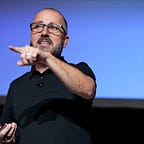Want to Know “How” Someone Thinks About a Business Problem or Project? Ask them this one Question
How do you define Strategy in this instance?
Language is a tricky thing. We often assume standard terms, mean standard things. But often, the way you are using a word, is perceived very differently by the person hearing it — and vice-versa. Strategy is one of those words that can really trip you up in a business conversation. It sounds like a big important word, and it is. But often it requires a double-click to ensure you and your team are all on the same page.
A minor digression, if you will indulge me.
I was recently invited to something called Goat Yoga in Phoenix, Arizona by a good friend and work colleague and it got me thinking a lot about word usage, communication, and asking for clarity. I recently wrote a piece about asking for clarity and you can find it here on Medium too. https://bit.ly/32hQHS0
Readers Note: Goat Yoga is a real thing — look it up.
Anyway, when my friend invited me to Goat Yoga, I actually didn’t think it would be yoga nor have anything to do with goats. I assumed it was like a “goat rodeo” (slang for a messy business thinking thing) or a wallow (more slang for a messy business thinking thing).
But as I lay prone, in street clothes, on a borrowed yoga mat — with a goat, not so gently, stepping on my nose — I got to thinking about business strategy. The way one does.
So now to the heart of this piece….. Finally!
If you really want to know “how” someone thinks — ask them how they define strategy, particularly in the context of the project or problem at hand.
Now this is where the goats come in!
G.O.A.T.S. — this is a simple way to do a quick, non-invasive, double-click to understand what/how the other person thinks:
- Strategy as a Goal or series of Goals
- Strategy as Objective or Objectives
- Strategy as Actions or Activities
- Strategy as Tactics or series of Tactics
- Strategy as Stuff
Strategy as a goal — is often what people mean; “We want to win the Super Bowl, or Champions League or PGA Tournament.”
But sometimes they mean it as an objective; “we want to launch our product by January 3rd and capture 10% market share by June 9th.”
Or maybe they mean a series of actions; “we will have an event in Las Vegas, with a keynote, and a press release…”
Quite often they really mean a series of tactics, “we will build some sell sheets, do a roadshow, meet with Steve from that company in Chicago, I forget the name, then we will give t-shirts away….”
Stuff is everything else. Its often a combination of the above, swinging from very tactical to very, ahem, strategic, and back again.
Actually in some way that’s pretty close to the Meriam-Webster's definition: a plan of action designed to achieve an overall policy or aim.
I am not expert on language (as you can plainly see) — but I have found this framing to be a great conversation starter and a terrific way to find clarity with others when it comes to strategy. So next time you hear someone say “this is the strategy” think about those GOATS!
Readers Note Bonus: Pro-tip — be warry when someone asks you generically “so what’s the/your strategy?”
Too often I have jumped into my spiel around strategy pillars, problem statements, 2by2 grids, GANT charts. When in fact the question they are sublimating might be as simple as, “tell me what you are up to,” or “I don’t understand what you are working on.” Don’t assume you know what they are asking. Ask for clarity before diving in.
Thanks for reading and swing by again when you have time.
My friend Willie is telling me these are nice little “work related thinking snacks” which I was thrilled to hear. Let me know what you think with claps or comments. I am keen to make these more useful and engaging.
